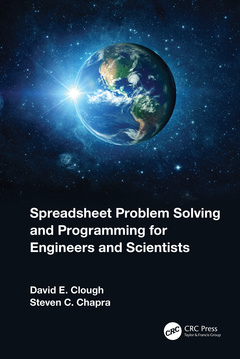Spreadsheet Problem Solving and Programming for Engineers and Scientists
Auteurs : Clough David E., Chapra Steven C.

Spreadsheet Problem Solving and Programming for Engineers and Scientists provides a comprehensive resource essential to a full understanding of modern spreadsheet skills needed for engineering and scientific computations.
Beginning with the basics of spreadsheets and programming, this book builds on the authors? decades of experience teaching spreadsheets and programming to both university students and professional engineers and scientists. Following on from this, it covers engineering economics, key numerical methods, and applied statistics. Finally, this book details the Visual Basic for Applications (VBA) programming system that accompanies Excel.
With each chapter including examples and a set of exercises, this book is an ideal companion for all engineering courses and also for self-study. Based on the latest version of Excel (Microsoft Excel for Microsoft 365), it is also compatible with earlier versions of Excel dating back to Version 2013. Including numerous case studies, this book will be of interest to students and professionals working in all areas of engineering and science.
Chapter 1 Spreadsheet Basics
Chapter 2 Charts and Graphs
Chapter 3 Engineering and Scientific Formulas
Chapter 4 Table-based Calculations
Chapter 5 Case Studies and Targeting
Chapter 6 Financial Calculations
Chapter 7 Numerical Methods
Chapter 8 Applied Statistics
Chapter 9 Introduction to VBA and Macros
Chapter 10 User-defined Functions
Chapter 11 VBA Programming
Chapter 12 User Interfaces
Appendix A: Matrix Algebra Review
Appendix B: Shortcut Keys and Key Combinations
David Clough joined the faculty of the Department of Chemical and Biological Engineering at the University of Colorado in 1975 after a brief career with DuPont in Wilmington, Delaware. He retired from Colorado in 2017 and holds the position of Professor Emeritus. He remains active at the university by assisting faculty and students in teaching and research. Notably, he teaches a series of workshops on process modeling and computer simulation as part of the senior design course sequence. In addition to this book, he has collaborated with Steve Chapra on two texts: Applied Numerical Methods with Python for Engineers and Scientists and Introduction to Engineering and Scientific Computing with Python.
Dr. Clough received degrees in chemical engineering from Case Western Reserve University and the University of Colorado. He has extensive experience in applied computing, process automation, and the modeling of various processes with emphasis on dynamic behavior, including polymerization, high-temperature catalytic reactors, fluidized beds, open-channel flow, biomedical instrumentation, and solar-thermal reactors.
Clough first learned to program in the original Fortran language while in high school in the early 1960s. Since then, he has experience in a wide array of programming languages and computing tools and has applied his expertise through his teaching, research, and industrial applications. In the 1980s, Clough and Steve Chapra originated the Introduction to Engineering Computing course for first-year students at the University of Colorado. The course is still taught and has included content on spreadsheets (originally Lotus 1-2-3, then Excel) and spreadsheet programming (VBA) for three decades.
Over his career, Clough has taught hundreds of in-person short courses to practicing professionals on applied computing and problem-solving. His courses on spreadsheet problem-solving, offered through the American Institute
Date de parution : 10-2023
15.2x22.9 cm
Thèmes de Spreadsheet Problem Solving and Programming for... :
Mots-clés :
Spreadsheets; Excel; Computer science; Programming; VBA; Statistics; Macros; Applied statistics; computations; Numerical methods; Cell C3; VBA Macro; Visual Basic Editor; Spherical Tank; Data Sets; Vice Versa; Array Formula; VBA Code; Cell Address; Goal Seek; F5 Key; Cash Flow Table; User Defined Function; Operational Row; Pivot Table; Macro Recorder; Event Handler; VBA Environment; VBA Program; Ordinary Differential Equations; LOOKUP Function; Pivot Chart; Van Der Waals Equation; IRR Function; NOAA's National Center



